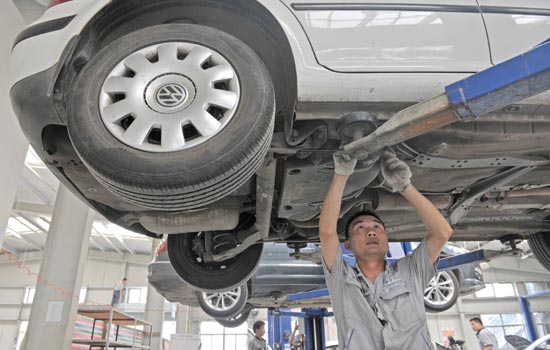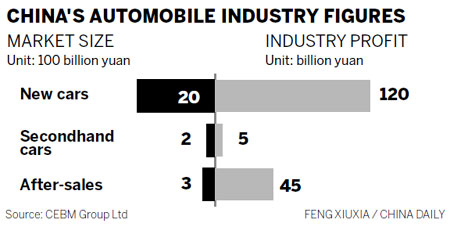
|
 |
|
An auto mechanic repairs a Volkswagen car in Nanjing. The number of automobiles in China was more than 106 million by the end of 2011, an increase of 16.4 percent year-on-year, according to data from the National Bureau of Statistics. [Photo/China Daily] |
Global auto-maintenance and parts companies are firing on all cylinders as they seek to tap the potential of China's after-sales services market.
The number of automobiles in the world's second-largest economy was more than 106 million by the end of 2011, an increase of 16.4 percent year-on-year, according to data from the National Bureau of Statistics.
Meanwhile, revenue in the Chinese automotive after-sales services market, which includes car maintenance, repairs, parts, modification and renting, is expected to be more than 400 billion yuan ($62.6 billion) by the end of 2012, according to a report on People.com.
One company that entered the burgeoning market early was Germany-based Wuerth Group, a top supplier of automotive maintenance supplies and a presence in China since 1994.
"Our automotive business grew well in the first half of this year, a rise of nearly 10 percent year-on-year, and this is quite a good development even as car sales are dropping," Christoph Ladurner, Wuerth China CEO, told China Daily.
Wuerth is aiming at annual sales of 2 billion yuan in the automotive sector, he said.
Wuerth's global sales reached 9.7 billion euros ($11.74 billion) in 2011, of which 500 million yuan ($78.28 million) came from the China market with a growth of 29.22 percent. Wuerth's automotive division accounted for about 30 percent of its total sales.
Ladurner said that while Europe and the United States are struggling with their respective economic woes, China's economy and purchasing power are strong.
"The after-sales service market is looking for solutions, not just products," Ladurner said. "The market means security for drivers and car owners, so it is important for us to give know-how to customers."
He said that as "4S stores" - so named because of their sales, spare parts, service and customer-satisfaction surveys - have become useful to car owners, Wuerth has played a bigger role in how they are run.
In 1994, Wuerth opened its first Chinese company in Tianjin. The network now includes more than 100 cities in China.
"Now we are playing in almost every region of China, which is our strength. We hire local people to serve local 4S stores," he said. And because Wuerth is a family enterprise, creating a family atmosphere for its workers is important, and Chinese culture is appreciated.
Ladurner said that Wuerth's brand is its biggest value, and informing customers of its premium quality is a priority. To that end, Wuerth has sponsored China's men's national basketball team and the China Touring Car Championship.
Also taking advantage of China's growth in auto care is Tyreplus, an automotive maintenance workshop chain set up by global tire manufacturer Michelin. Tyreplus has more than 730 workshops in China, and its five-year target is to double that.
"Although the growth of China's economy may slow this year, the after-sales service market keeps increasing," said Liao Chuhang, a director at Tyreplus and a distribution development manager at Michelin China.
Liao said more car owners understand that not all their cars' problems are serious enough to require a trip to a 4S store. More car owners are choosing other auto-maintenance options when their vehicle warranties expire, he said.
Liao said Michelin entered China early in 1988 when it set up its first office in Hong Kong, and drove into the mainland market in 2003.
Liao said Tyreplus' 14 main services, including washing, tire replacement and oil changes, offer customers convenience.
"Apart from 4S stores, the network Tyreplus developed has been the largest in China among car-maintenance workshops, and the market is still fragmented," Liao added.
Meanwhile, the market for automobile service continues to expand. About 20,000 4S stores were in China in April, and that number will grow to about 30,000 by the end of 2015, according to the State Administration for Industry and Commerce as quoted by the Beijing Morning Post.
caixiao@chinadaily.com.cn



 Washington to remain focused on Asia-Pacific
Washington to remain focused on Asia-Pacific RQFII target blue chips amid bear market
RQFII target blue chips amid bear market Australian recall for top two exporters
Australian recall for top two exporters China fears new car restrictions
China fears new car restrictions